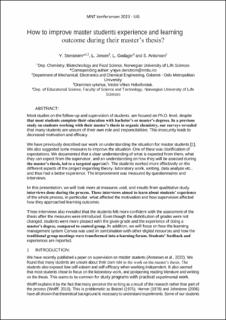Can master students’ experience and learning outcome, be improved?
Peer reviewed, Journal article
Published version
Permanent lenke
https://hdl.handle.net/11250/3105599Utgivelsesdato
2023Metadata
Vis full innførselSamlinger
Sammendrag
Most studies on the follow-up and supervision of students, are focused on Ph.D. level, despite
that most students complete their education with bachelor’s or master’s degrees. In a previous
study on students working with their master’s thesis in organic chemistry, our surveys revealed
that many students are unsure of their own role and responsibilities. This insecurity leads to
decreased motivation and efficacy.
We have previously described our work on understanding the situation for master students [1].
We also suggested some measures to improve the situation. One of these was clarification of
expectations. We documented that a clear understanding of what is expected from them, what
they can expect from the supervisor, and an understanding on how they will be assessed during
the master’s thesis, led to a targeted approach. The students worked more effectively on the
different aspects of the project regarding theory, laboratory work, writing, data analysis etc.,
and thus had a better experience. The improvement was measured by questionnaires and
interviews.
In this presentation, we will look more at measures used, and results from qualitative study
interviews done during the process. These interviews aimed to learn about students’ experience
of the whole process, in particular, what affected the motivation and how supervision affected
how they approached learning outcomes.
These interviews also revealed that the students felt more confident with the assessment of the
thesis after the measures were introduced. Even though the distribution of grades were not
changed, students were more pleased with the given grade and the experience of doing a
master’s degree, compared to control group. In addition, we will focus on how the learning
management system Canvas was used in combination with other digital resources and how the
traditional group meetings were transformed into a learning forum. Students’ feedback and
experiences are reported.

